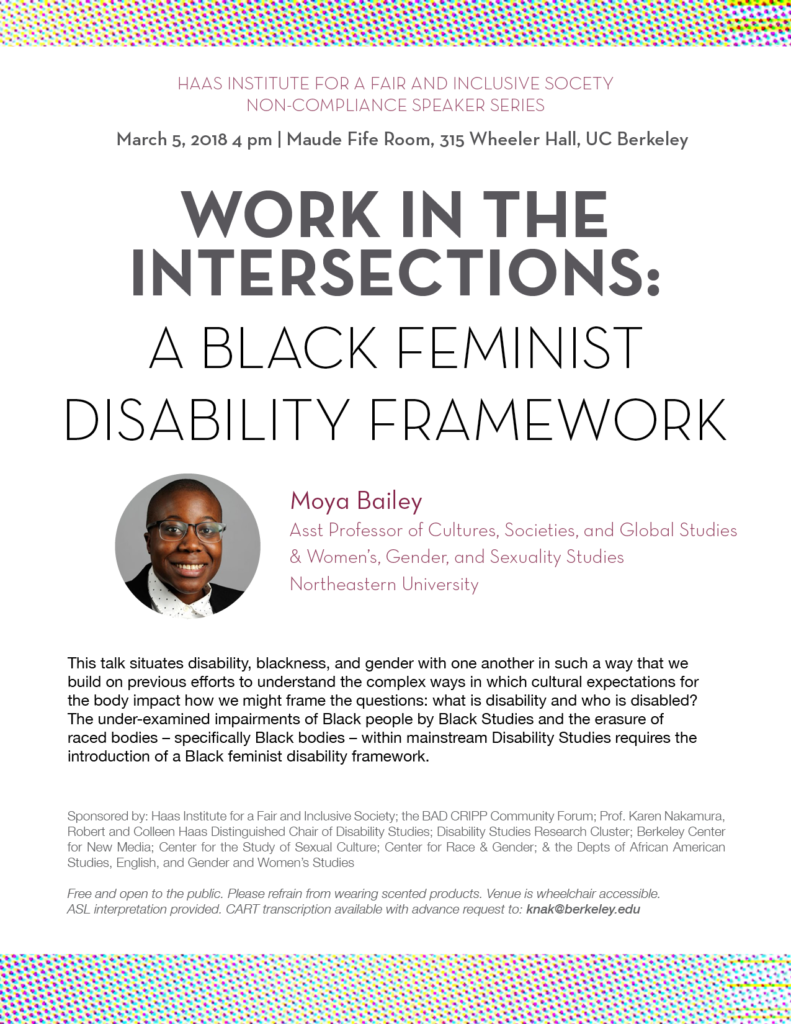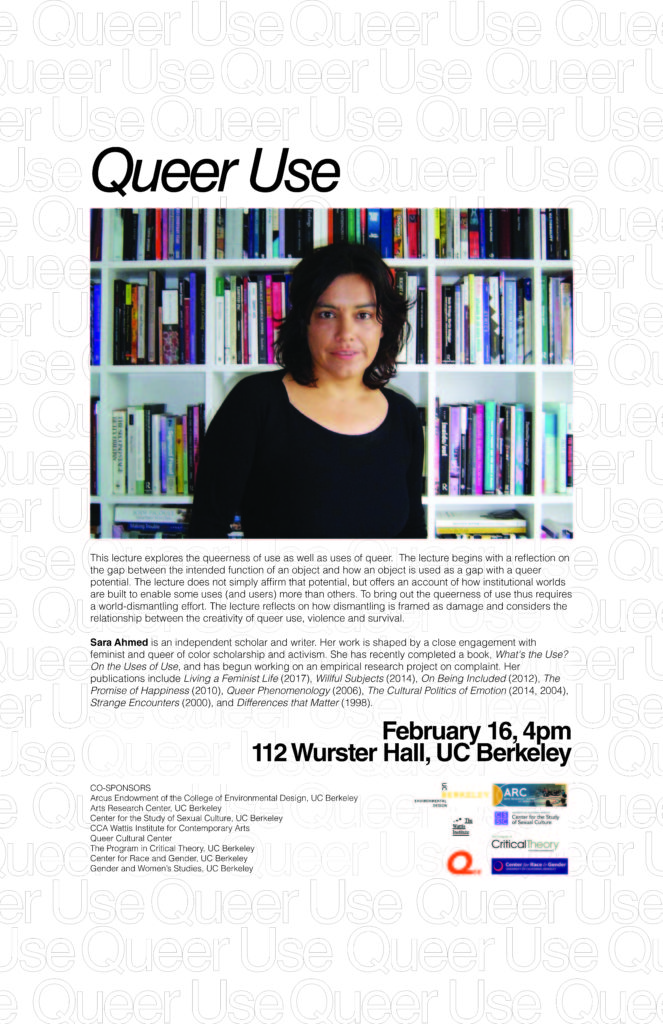2015
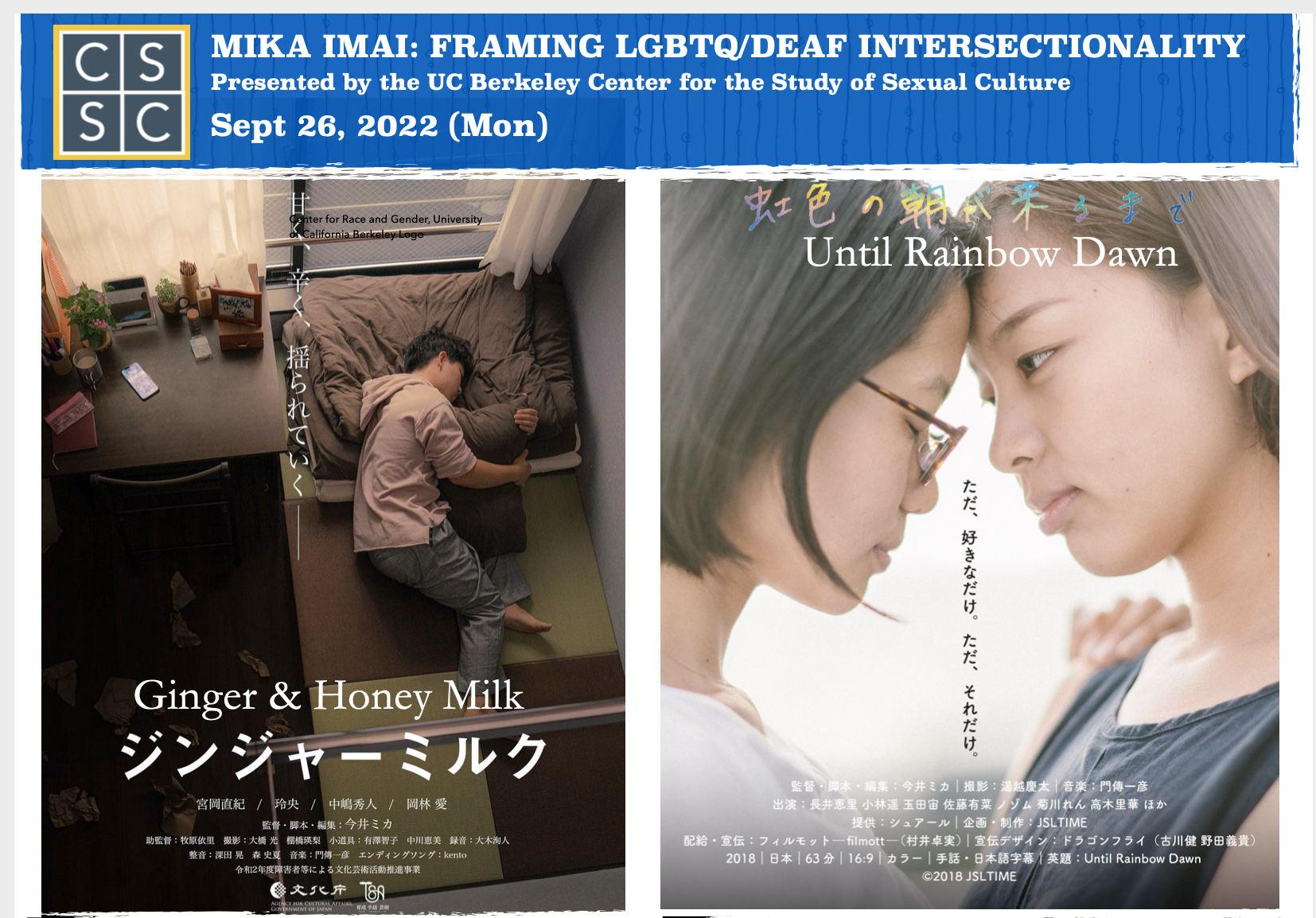
MIKA IMAI: Framing LGBTQ/DEAF Intersectionality
The UC Berkeley Center for the Study of Sexual Culture will feature the filmmaker Mika Imai from Japan, the creator of the LGBTQ/Deaf films Ginger and Honey Milk and Until Rainbow Dawn. Imai will screen the two films and participate in Q&A sessions.
Imai’s work derives from personal experiences of sharing one’s gender identity and the reception from family, friends and acquaintances. The films depict encounters that subsequently empower the protagonists to reframe and broaden their social relationships. Imai encapsulates real life events to extend our understanding of intersectional LGBTQ/Deaf identity. Imai’s work has featured at the 27th Rainbow Reel Tokyo International Lesbian & Gay Film Festival, the 29th Hong Kong Lesbian & Gay Film Festival, and the 3rd Tokyo Deaf International Film Festival.
FILM SCREENINGS WITH Q&A SESSIONS
Sept 26, 2022 (Mon)
12:00-14:00 Ginger & Honey Milk
18:00-20:30 Until Rainbow Dawn
Location:
370 Dwinelle Hall, UC Berkeley (Level F)
Directions to room 370 linked here
This event is free and open to the public.
ASL & Japanese Sign Language (JSL) interpretation provided.
This event is wheelchair accessible.
We ask that all attendees wear high quality masks and avoid wearing fragrances for this event whenever possible.
Please visit the CSSC NEWS page for film trailers and the Mika Imai LGBTER interview excerpts.
Ginger & Honey Milk
“Maybe I’m gay” says Kento to a friend, Rei. Amid a Covid-19 state of emergency this drama traces the lives of four university students, both Deaf and hearing. Their joys and sorrows intersect in a complex four way relationship.
[2021, Japanese Sign Language, English subtitles, Japanese subtitles/60 mins]
Until Rainbow Dawn
Hana and Ayumi, both Deaf, meet at a sign language circle and begin to build a close relationship; however, when Hana tells her parents about falling in love with Ayumi, she is rejected by her mom. Ayumi invites Hana to a Deaf LGBTQ gathering that strengthens their bond. [2018, Japanese Sign Language, English subtitles/63 mins]
Cosponsored with: The Dept. of Gender & Women’s Studies, The Center for Race and Gender, The Othering and Belonging Institute (OBI) Disability Studies Cluster, The Center for Japanese Studies, QWOCMAP: Queer Women of Color Media Arts Project, and the UC Berkeley GWS Visiting Scholar from Meiji University.
Please make inquires or access requests by email at cssc@berkeley.edu or via the QR code on the event poster.
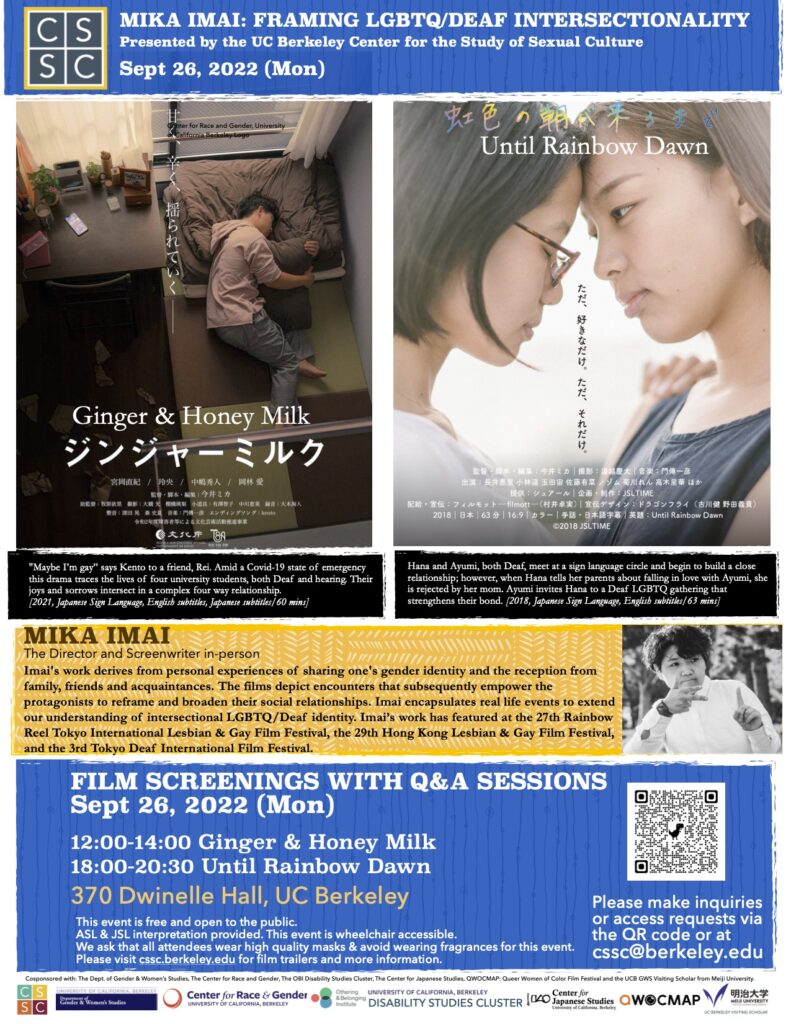
There will be a Panel Discussion as part of the 18:00-20:00 Until Rainbow Dawn screening. The participants are listed below.
Bios of Today’s Panelists
Mika Imai has been filmmaking since the sixth grade and by sophomore year in high school was recognized with a best film award at the Yokohama Deaf Art Festival. In 2014 Imai received a best film award at the 2nd annual Irish Deaf Film Festival for the short film Sign Name Game. Imai’s earliest work relies upon visual action and Japanese Sign Language (JSL) as the vessels for expression. Imai’s first film to incorporate a soundtrack, Until Rainbow Dawn, debuted in 2019 at the 27th Rainbow Reel Tokyo International Lesbian and Gay Film Festival and featured at the 29th Hong Kong Lesbian and Gay Film Festival. Imai’s latest feature Ginger and Honey Milk premiered to a sold out audience at the 3rd Tokyo Deaf International Film Festival in 2021.
Imai produces a variety of entertainment such as the comedian duo “Deaf W”, and media such as “The Sign Language Picture Book of Living Creatures”, and in addition does video production work including commercials. Imai’s Youtube commercial for the Japan Foundation Phone relay service, “Never Give Up” premiered in March 2022 and in one month received over two million views.
Drago Rentería is a Deaf and disabled Chicano transgender elder and long-time LGBTQ/social justice activist, leader, and educator. Drago serves as Executive Director of Deaf Queer Resource Center, a national organization, based in San Francisco, for Deaf LGBTQ communities. He is also currently on the Transgender Law Center’s national Disability Project Advisory Board. In addition to his LGBTQ activism work, Drago is also a photojournalist and documentary photographer and uses his photography to bring more awareness to issues such as racism, housing injustice, police brutality, and gentrification. He is a graduate of UC Berkeley and did part of his undergrad work at Gallaudet University.
Karen Nakamura is the Haas Distinguished Chair of Disability Studies and Professor of Anthropology. She is a cultural and visual anthropologist and filmmaker whose research focuses on disability, sexuality, and minority social movements in contemporary Japan. Her first book, Deaf in Japan, was on sign language, identity, and deaf social movements. Her second book on schizophrenia and mental illness in Japan, entitled, A Disability of the Soul, was published in 2013 and was also accompanied by two films entitled Bethel: Community and Schizophrenia in Northern Japan and A Japanese Funeral. Her new project explores the intersections of disability, gender, and sexuality.
Johnny George is an Assistant Professor from Meiji University in the Department of Political Science and Economics. He is a Visiting Scholar in the Gender and Women’s Studies Department. His primary work focuses on the linguistics of Japanese Sign Language. He is currently working on a project examining the representation of Japanese Sign language and JSL users in film and media.
Mel Y. Chen (moderator, they/them/ta+) is the Richard and Rhoda Goldman Distinguished Chair in Undergraduate and Interdisciplinary Studies and Director of the Center for the Study of Sexual Culture, as well as the Disability Studies Minor. Mel hails from the Department of Gender and Women’s Studies and teaches and researches in areas including critical animal studies, language, trans studies, disability studies, sexuality and race, as well as in the arts. Mel’s first book, Animacies, is about colonial hierarchies of being. A second book is forthcoming in 2023, entitled Intoxicated: Race, Disability and Chemical Intimacies of Empire. Mel is also a member of a sustaining queer-trans of color arts group and is on the Board of Directors of the Queer Women of Color Media Arts Project.
Special thanks to:
Gillian Edgelow (Gender and Women’s Studies Administrator)
The event interpreters: Jennifer Mantle, Octavia Spiegel, Dane Lentz, Cassandra McAlmont, Megumi Kawakami, and Ikumi Kawamata
***POSTPONED*** “Racist Love: Asian Abstraction and the Pleasures of Fantasy”
We write to inform you that the hybrid event scheduled with Leslie Bow, “Racist Love,” at 5 PST has been postponed (both in person and online), with a new date to be determined.
We hope this finds you all safe. Some of you have registered from other locations and you may not have been informed of the distressing situation now happening at the UC Berkeley campus. Campus was under a shelter-in-place order from 9:30 this morning until just before 2 PM, with a distressed student potentially in a violent situation. We wanted to consult with Professor Bow about how/whether to go ahead with the event tonight. Certainly, the intensity of the situation on campus and the shut down of buildings obviated any in-person form of the event. But we were trying to decide whether to still go ahead with the online (Zoom) portion of the event with Professor Bow, given the great interest in her talk. We ended up having a deeply meaningful conversation about the relevance of her talk (which is, she shared, partly about what it means to insist on intellectual production under distress) to what was happening on campus and to the structures and presents fueling forms of distress, both of those locked in their buildings and of the student. As Professor Bow said, “there is a tragedy unfolding, we just don’t know whose yet.”
We do not make this decision lightly, and in mind of all those affected (some of whom were planning to come), we are trying our best to make it with care.
Please note that we are keeping this registrant list for the Zoom event, and you may note that we have temporarily moved the formal date/time of today’s Zoom meeting to 12 midnight on January 1, 2023 as a placeholder. This enables us to update you all of the new details once we have them.
Best wishes from us at CSSC and from Professor Bow, and do please stay tuned for a rescheduled date for a hybrid event in early fall 2022.
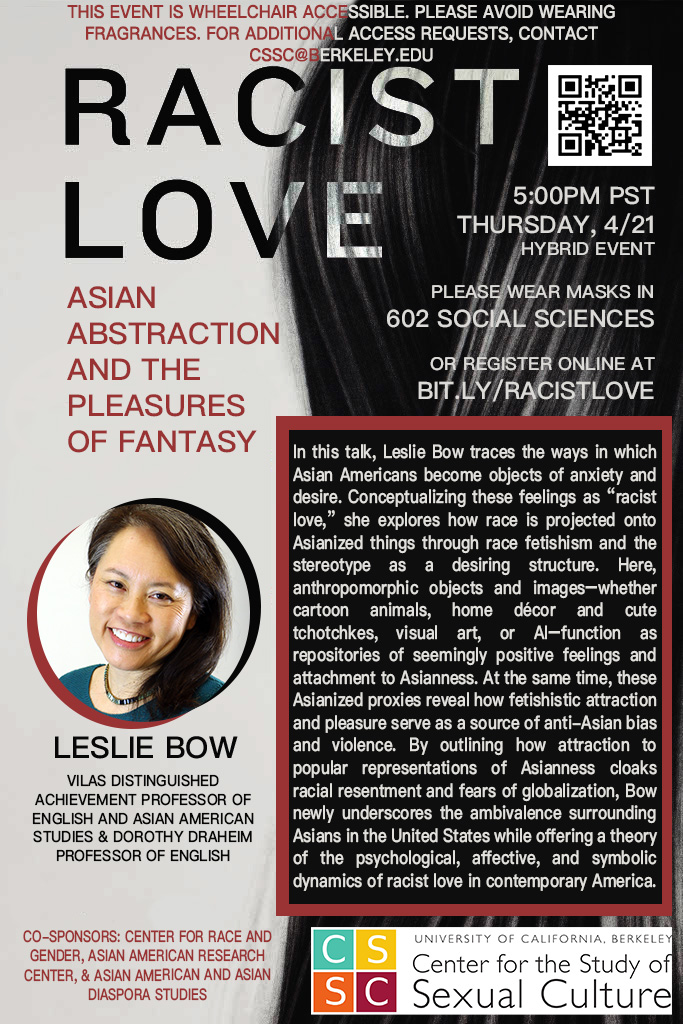
The Center for the Study of Sexual Culture is excited to welcome Prof. Leslie Bow (UW-Madison, English) to UC Berkeley on Thursday, April 21st at 5pm PST for a hybrid (in-person and on Zoom) event about her new book, Racist Love. Please join us with masks in 602 Social Sciences or register online at bit.ly/racistlove.
Leslie Bow is Vilas Distinguished Achievement Professor of English and Asian American Studies and Dorothy Draheim Professor of English at the University of Wisconsin-Madison. She is the author of the award-winning, ‘Partly Colored’: Asian Americans and Racial Anomaly in the Segregated South (New York University Press, 2010); Betrayal and Other Acts of Subversion: Feminism, Sexual Politics, Asian American Women’s Literature (Princeton University Press, 2001). Her co-edited volume, The Oxford Handbook of Twentieth-Century American Literature, is forthcoming with Oxford. Her new book, Racist Love: Asian Abstraction and the Pleasures of Fantasy, is just out with Duke University Press.
In Racist Love Leslie Bow traces the ways in which Asian Americans become objects of anxiety and desire. Conceptualizing these feelings as “racist love,” she explores how race is projected onto Asianized things through race fetishism and the stereotype as a desiring structure. Bow shows how anthropomorphic objects and images–whether cartoon animals, home décor and cute tchotchkes, contemporary visual art, or AI–function as repositories of seemingly positive feelings and attachment to Asianness. At the same time, Bow demonstrates that these Asianized proxies reveal how fetishistic attraction and pleasure serve as a source of anti-Asian bias and violence. By outlining how attraction to popular representations of Asianness cloaks racial resentment and fears of globalization, Bow provides a new means of understanding the ambivalence surrounding Asians in the United States while offering a theory of the psychological, affective, and symbolic dynamics of racist love in contemporary America.
This event is co-sponsored by the Center for Race and Gender, Asian American and Asian Diaspora Studies, and the Asian American Research Center at the Institute for the Study of Societal Issues.
This event is wheelchair accessible. Please avoid wearing fragrances, but please do wear masks. For additional access requests, contact cssc@berkeley.edu.
QUEER LOVE ON BARBARY LANE: THE SEXUAL POLITICS OF SERIAL GAY FICTION IN ARMISTEAD MAUPIN’S TALES OF THE CITY
In this talk, I analyze the content and reading experience of Armistead Maupin’s Tales of the
City, the most popular serialized gay fiction of the 1970s, which appeared in daily installments
in the San Francisco Chronicle between 1976-1983. I argue that the serialized rhythm of the
narrative—which followed the social and sexual misadventures of a cadre of queer friends in
San Francisco’s Nob Hill neighborhood—modeled gay liberation’s conception of “coming out of
the closet” about one’s sexuality as a process that unfolds over time through repeated
encounters with new erotic possibilities. I draw upon interviews I conducted with actual San
Francisco readers of Maupin’s original text alongside close analysis of the rhetorical and literary
modes of address that Maupin deployed to make “coming out” a widely accessible form for
articulating one’s sexual and social desires, regardless of one’s specific sexual identity. I show
the story’s unfolding narrative about 1970s queer social life and the actual experience of
reading it daily alongside other San Francisco residents helped disseminate the radical sexual
politics of gay liberation to both gay and straight audiences alike.
Ramzi Fawaz is associate professor of English at the University of Wisconsin, Madison. He is the
author of The New Mutants: Superheroes and the Radical Imagination of American Comics (NYU
Press, 2016). His work has been published in numerous journals including American
Literature, GLQ, Feminist Studies, Callaloo, and PMLA. With Darieck Scott he co-edited a special
issue of American Literature titled “Queer About Comics,” which won the 2019 best special
issue of the year award from the Council of Editors of Learned Journals. His new book Queer
Forms explores the aesthetic and imaginative influence that movements for women’s and gay
liberation had on U.S.-American popular culture in the 1970s and after. Queer Forms will be
published by NYU Press.
Eric Stanley, in conversation with Jemma DeCristo, delivers talk, “Becoming Ungovernable: Trans Life Against the State” (4/12)
This past spring CSSC had the pleasure of hosting UC Berkeley professor Eric Stanley for their talk, “Becoming Ungovernable: Trans Life Against the State,” and conversation with Dr. Jemma DeCristo.
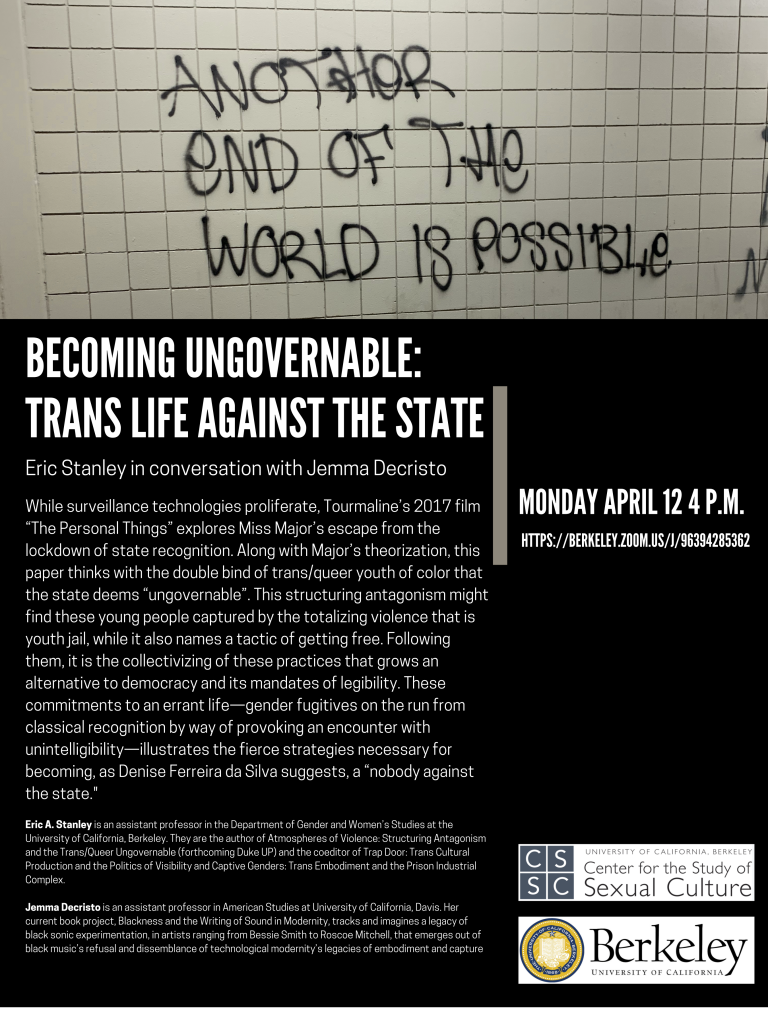
While surveillance technologies proliferate, Tourmaline’s 2017 film “The Personal Things” explores Miss Major’s escape from the lockdown of state recognition. Along with Major’s theorization, this paper thinks with the double bind of trans/queer youth of color that the state deems “ungovernable”. This structuring antagonism might find these young people captured by the totalizing violence that is youth jail, while it also names a tactic of getting free. Following them, it is the collectivizing of these practices that grows an alternative to democracy and its mandates of legibility. These commitments to an errant life—gender fugitives on the run from classical recognition by way of provoking an encounter with unintelligibility—illustrates the fierce strategies necessary for becoming, as Denise Ferreira da Silva suggests, a “nobody against the state.”
Eric A. Stanley is an assistant professor in the Department of Gender and Women’s Studies at the University of California, Berkeley. They are the author of Atmospheres of Violence: Structuring Antagonism and the Trans/Queer Ungovernable (forthcoming Duke UP) and the coeditor of Trap Door: Trans Cultural Production and the Politics of Visibility and Captive Genders: Trans Embodiment and the Prison Industrial Complex
Jemma DeCristo is an assistant professor in American Studies at University of California, Davis. Her current book project, Blackness and the Writing of Sound in Modernity, tracks and imagines a legacy of black sonic experimentation, in artists ranging from Bessie Smith to Roscoe Mitchell, that emerges out of black music’s refusal and dissemblance of technological modernity’s legacies of embodiment and capture
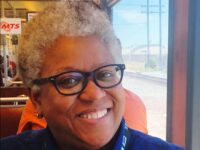
Visual Activism: Ajuan Mance (Cosponsored by CSSC)
This talk is sponsored by the Visual Activism series and co-sponsored by the Center for the Study of Sexual Culture.
Ajuan Mance is a Professor of English at Mills College and a lifelong artist and writer. She holds a B.A. from Brown University and an M.A. and Ph.D. from the University of Michigan. In both her scholarly writing and her visual art, Ajuan explores the complexities of race, gender, and identity in the U.S. The creator of the 1001 Black Men online sketchbook, Ajuan has participated in solo and group exhibitions as well as comic and zine fests, from the Bay Area to Brooklyn. Ajuan’s comics include the Gender Studies series, the comic strip Check All That Apply, and others. Her comics have appeared in several anthologies including, most recently, Drawing Power from Abrams Press, winner of the 2020 Eisner award.
About the Visual Activism series: How has visual culture played a role within the social movements of the last several decades, such as #BlackLivesMatter and Extinction Rebellion? How, we might ask, is activism made visible; how does it erupt (or disappear) with collective fields of vision? Drawing upon Black South African queer photographer Zanele Muholi’s term “visual activism” as a flexible rubric that encompasses both formal practices and political strategies, this series interrogates visual cultures of dissent, resistance, and protest.
Visual Activism is sponsored in part by a Creative Discovery Grant from UC Berkeley’s Arts + Design Initiative.
This talk will take place online
Please check later for the link
ANTICIPATORY NOSTALGIA: QUEERING THE HONG KONG HANDOVER
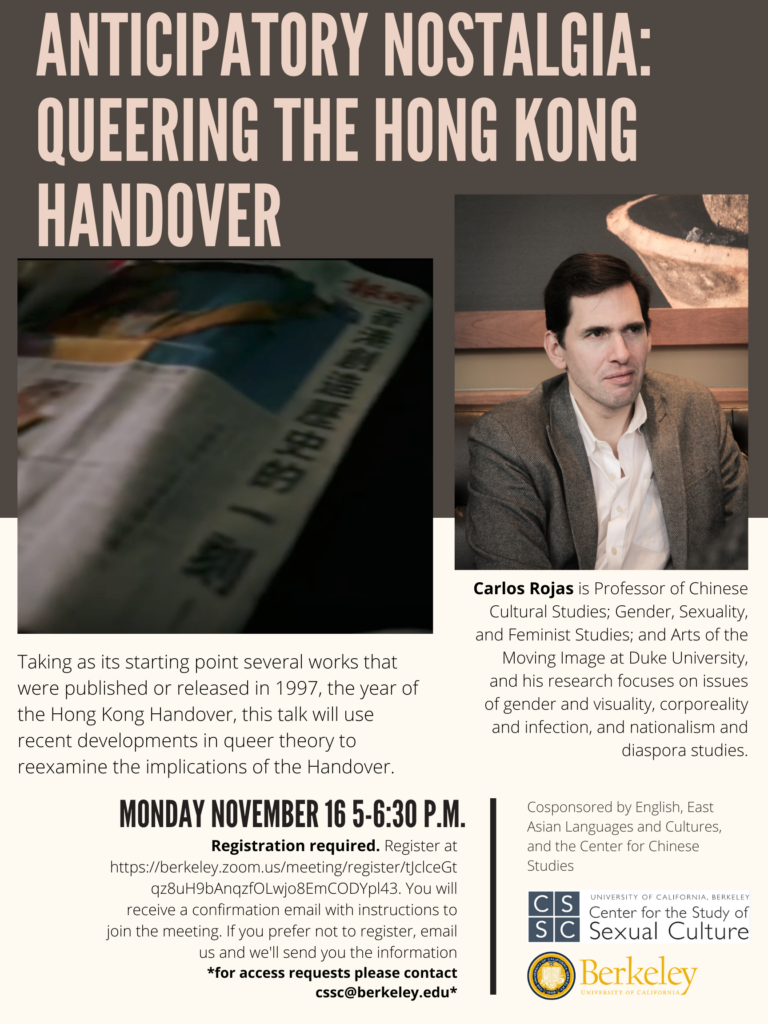
Taking as its starting point several works that were published or released in 1997, the year of the Hong Kong Handover, this talk will use recent developments in queer theory to reexamine the implications of the Handover.
Carlos Rojas is Professor of Chinese Cultural Studies; Gender, Sexuality, and Feminist Studies; and Arts of the Moving Image at Duke University, and his research focuses on issues of gender and visuality, corporeality and infection, and nationalism and diaspora studies.
Registration required. Register at https://berkeley.zoom.us/meeting/register/tJclceGtqz8uH9bAnqzfOLwjo8EmCODYpl43. You will receive a confirmation email with instructions to join the meeting. If you prefer not to register, email us and we’ll send you the information.
*for access requests please contact cssc@berkeley.edu*
This event is cosponsored by English, East Asian Languages and Cultures, and the Center for Chinese Studies.\
This talk has been added to our youtube page.
#metoobehindbars: Queer/Trans Rebellion Across Prison Walls, a conversation with Alisa Bierria and Rojas
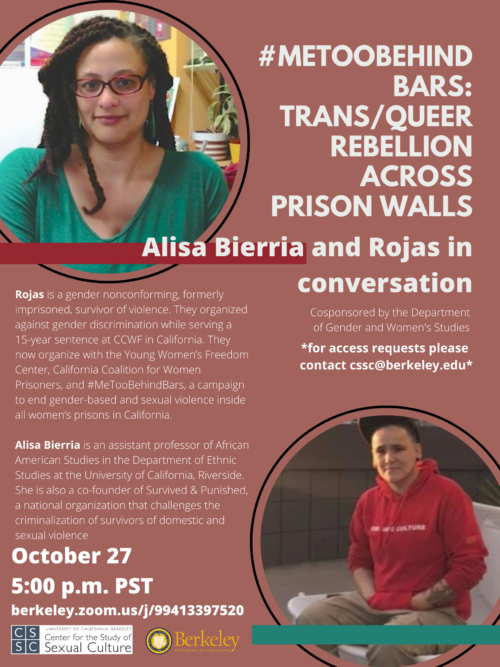
#metoobehindbars: Queer/Trans Rebellion Across Prison Walls, a conversation with Alisa Bierria and Rojas
Rojas is a gender nonconforming, formerly imprisoned, survivor of violence. They organized against gender discrimination while serving a 15-year sentence at CCWF in California. They now organize with the Young Women’s Freedom Center, California Coalition for Women Prisoners, and #MeTooBehindBars, a campaign to end gender-based and sexual violence inside all women’s prisons in California.
Alisa Bierria is an assistant professor of African American Studies in the Department of Ethnic Studies at the University of California, Riverside. She is also a co-founder of Survived & Punished, a national organization that challenges the criminalization of survivors of domestic and sexual violence.
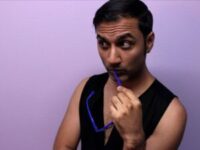
Visual Activism: Devi Peacock (Cosponsored by CSSC)
This talk is sponsored by the Visual Activism series and co-sponsored by the Center for the Study of Sexual Culture.
Devi Peacock is a sixteenth-generation storyteller; a comedy writer; co-organizer of the Liberated 23rd Ave. cultural land trust; and the founding Artistic and Executive Director of Peacock Rebellion, a Huichin (Ohlone land/Oakland) -based crew of queer and trans Black, Indigenous, people of color (QTBIPOC), named one of the “100 people, organizations and movements shaping the future of culture.” Devi is an advisor to the Resilience Archives and the East Bay Permanent Real Estate Cooperative and a member of the QTPOC4SHO arts collective. Devi was an organizer at the Queer Cultural Center, home of the National Queer Arts Festival; a cultural equity Fellow with Emerging Arts Professionals and the Community Arts Stabilization Trust; co-led Liberating Ourselves Locally, a QTBIPOC maker space; and serves on funding, curation, and speaking panels for groups including the Arts & Democracy Network, California Arts Council, Center for Cultural Innovation, Dance/USA, Grantmakers in the Arts, National Performance Network, National Queer Arts Festival, and the United States of Asian America Festival. Devi taught comedic arts at Stanford and, pre-COVID times, got paid to share shart jokes for social justice across North America.
Photo credit: Luna Merbruja.
About the Visual Activism series: How has visual culture played a role within the social movements of the last several decades, such as #BlackLivesMatter and Extinction Rebellion? How, we might ask, is activism made visible; how does it erupt (or disappear) with collective fields of vision? Drawing upon Black South African queer photographer Zanele Muholi’s term “visual activism” as a flexible rubric that encompasses both formal practices and political strategies, this series interrogates visual cultures of dissent, resistance, and protest.
Visual Activism is sponsored in part by a Creative Discovery Grant from UC Berkeley’s Arts + Design Initiative.
This talk will take place online
Please check later for the link
Lines of Flight: Grace Jones, LSD, and Black Radical Praxis
Lines of Flight: Grace Jones, LSD, and Black Radical Praxis
Associate Professor Uri McMillan (UCLA)
Tuesday, November 26th, 2019
5 pm Lecture | 300 Wheeler Hall UC Berkeley
12 pm | Workshop for graduate students at 650 Barrows Hall UC Berkeley
RSVP to cssc@berkeley.edu to attend workshop
This paper centers on artist-performer Grace Jones. Specifically, it explores her acid use in the late 1960s, as an alternative form of consciousness, knowledge-production, and a sublime act of becoming. Combining performance studies, black diaspora studies, and feminist theory, this paper asks that we consider this moment as emblematic of defiant, albeit quiet, forms of refusal that put pressure on what ultimately counts as black radical praxis as well as aesthetic inspiration.
Sparking Joy, Serving Mess: Performing the Drag of Asian/American History
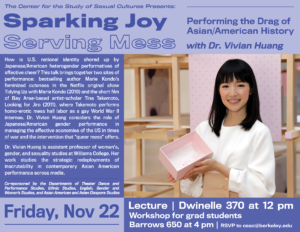
504 and Beyond: Disability Politics and the Black Panther Party
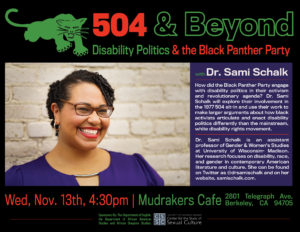
In solidarity with the AFSCME strike that day, this event has been relocated to Mudrakers Cafe and the time changed to 4:30 pm to give everyone time to arrive from campus.
4:30 pm Lecture with Dr. Sami Schalk, Mudrakers Cafe
How did the Black Panther Party engage with disability politics in their activism and revolutionary agenda? Sami Schalk will explore their involvement in the 1977 504 sit-in and use their work to make larger arguments about how black activists articulate and enact disability politics differently than the mainstream, white disability rights movement.
Sami Schalk is an assistant professor of Gender & Women’s Studies at University of Wisconsin-Madison. Her research focuses on disability, race, and gender in contemporary American literature and culture. Schalk’s first book, Bodyminds Reimagined: (Dis)ability, Race, & Gender in Black Women’s Speculative Fiction (Duke UP 2018), explores how black women writers use non-realist genres to reimagine the possibilities and limits of bodyminds, challenging our understanding of the meanings of disability, race, and gender. Schalk’s next project focuses on disability politics in black activism in the post-Civil Rights era. She identifies as a fat, black, queer, femme, non-disabled cis-gendered woman. She can be found on Twitter as @drsamischalk and on her website, samischalk.com.
Co-sponsored by the Center for the Study of Sexual Culture, the Department of English, and the Department of African American Studies and African Diaspora Studies.
Ev’ry Body, This Time: A Sexuality Studies Conference Call for Papers – deadline extended to Feb 28
A conference free and open to the public hosted by the Center for the Study of Sexual Culture
University of California, Berkeley
April 12-14, 2018 at Sutardja Dai Hall on the U.C. Berkeley campus
Berkeley, California
For most recently updated information please visit cssc.berkeley.edu
The submission deadline has been extended to Feb 28th, with rolling decisions announced.
Conference Description
“Ev’ry Body, This Time.” The elision in ev’ry gestures in multiple ways: to the bodies that have been exempted in various iterations of sexuality studies, and to our quixotic desire to (re-)emplace them. It refers as well to the shifting and ever-proliferating fact of bodies: the way that apparent gaps may not represent incompleteness, but point instead to troubled standards of perceiving or evaluating wholeness; that filling a gap can thus provisionally flesh out bodies that are at once legible and illegible. Race and gender, in their mutable complexities, sit at the core of these questions. Our apostrophe calls to a multitude of bodies, recognizing the potential for thinking through, substituting, re-visioning, and, ultimately, holding space for, bodies that exceed categorical legislation and rhetorical disciplinarity. We also note that embodiment is not everyone’s cup of tea. We flag the body, ev’ry body, because sensuousness has too often been left out of considerations of sexuality and politics. Simultaneously, we wonder how given languages about sex and meaning work in relation to disability, debility; in the realm of the digital; under the aegis of asexuality?
This Time means both that we view this as a conference that belongs to a history of academic conferences in queer studies and that we view this as a conference that is happening in a perilous present moment. How is the critical study of sexuality evolving and in response to what imperatives? What is the relation of this time to other times (and places) and how are the particular urgencies of this time tied to other moments? Is the critical study of sexuality always explicitly about sexuality, now?
In conjoining Ev’ry Body and This Time, we issue a challenge (one with a dash of utopianism in it) to ourselves and to the conference participants: What future do “we” want looking forward from where we stand?
The conference will feature both panels assembled in response to an open call for abstracts, as well as invited speakers who currently include: Qwo-li Driskill, Alison Kafer, Amber Musser, Gemma Romain, Nayan Shah, Amy Sueyoshi, Omi’seke Natasha Tinsley, Qian Wang, Gloria Wekker, and more to be confirmed, alongside workshops and other conference events. Please check cssc.berkeley.edu for further announcements concerning the call for papers and abstract submission, accessibility information, and reserving a spot for attendees.
Submission email (submissions only): csscconf2018@gmail.com
Please direct all inquiries to cssc@berkeley.edu
Besides providing wheelchair access, this event aims to be broadly accessible, including practices of both disability and gender accessibility.
Abstract Submission Requirements:
We encourage submissions from scholars, artists, activists both working within institutions and organizations, as well as independently.
Single paper abstracts should be 300-500 words in length. Accepted papers will be arranged into panels. Include a bio or CV.
Panel submissions should total 750-1000 words. Panels may include 3-4 people. Please include a 250 word abstract of your panel theme, and include substantial descriptions of each paper. Accepted panels will be assigned chairs or respondents from the U.C. Berkeley host community; please note any special requests thereof. We encourage panels to have a diversity of institutional representation and also of membership: graduate students, faculty, and independent artists/scholars/activists. Include a bio or CV for each speaker.
The submission deadline has been extended to Feb 28th, with rolling decisions announced. Submissions must be sent to the dedicated email address csscconf2018@gmail.com (submissions only) in order to be considered. We aim to respond to proposals by February 15, 2018. Please direct any inquiries about submissions or the conference to cssc@berkeley.edu.
Affordability: The conference is free to all, but we understand that traveling to a conference can be prohibitively costly. To help defray costs of staying in the Bay Area, we will be organizing a limited number of informal housing possibilities (free couch shares) in addition to providing suggestions for local hotels. The location of the conference is near several campustown districts that offer a variety of dining options, many of which include dietary options.
Work in the Intersections: A Black Feminist Disability Framework
This talk situates disability, blackness, and gender with one another in such a way that we build on previous efforts to understand the complex ways in which cultural expectations for the body impact how we might frame the questions: what is disability and who is disabled? The under-examined impairments of Black people by Black Studies and the erasure of raced bodies – specifically Black bodies – within mainstream Disability Studies requires the introduction of a Black feminist disability framework. By employing a Black feminist disability framework, scholars of African American and Black Studies, Women’s, Gender, and Sexuality Studies, and Disability Studies have a flexible and useful methodology through which to consider this historical, social, cultural, political, and economic reverberations of disability for Black disabled people. This talk is based on a forthcoming article co-authored by Moya Bailey and Izetta Mobley.
Dr. Moya Bailey is Assistant Professor of Cultures, Societies, and Global Studies and of Women’s, Gender, and Sexuality Studies at Northeastern University. Her work focuses on Black women’s use of digital media to promote social justice as acts of self-affirmation and health promotion. She is interested in how race, gender, and sexuality are represented in media and medicine. She currently curates the #transformDH Tumblr initiative in Digital Humanities (DH). She is a monthly sustainer of the Allied Media Conference, through which she is able to bridge her passion for social justice and her work in DH. She is the founder and co-conspirator of Quirky Black Girls, a network for strange and different black girls, and now serves as the digital alchemist for the Octavia E. Butler Legacy Network (http://octaviabutlerlegacy.com/). Her co-authored book #HashtagActivism: Race and Gender in America’s Network Counterpublics is forthcoming from MIT Press in 2019, and she is completing another book titled Contesting Misogynoir: Black Women’s Digital Resistance in U.S. Culture.
Sponsored by: Haas Institute for a Fair and Inclusive Society; the BAD CRIPP Community Forum; Prof. Karen Nakamura, Robert and Colleen Haas Distinguished Chair of Disability Studies; Disability Studies Research Cluster; Berkeley Center for New Media; Center for the Study of Sexual Culture; Center for Race & Gender; & the Departments of African American Studies, English, and Gender and Women’s Studies
Please refrain from wearing scented products. Venue is wheelchair accessible. ASL interpretation provided. CART transcription available with advance request to: knak@berkeley.edu
facebook event page: https://www.facebook.com/events/970972043054748/
Queer Use
Join us for a talk on Queer Use with renowned scholar Sara Ahmed on February 16 at 4:00 pm, 112 Wurster Hall. The lecture is free and open to the general public.
We will also be hosting a conversation with Professor Ahmed for graduate students only. Please contact CSSC to RSVP for the graduate student conversation at cssc@berkeley.edu.
Queer Use
This lecture explores the queerness of use as well as uses of queer. The lecture begins with a reflection on the gap between the intended function of an object and how an object is used as a gap with a queer potential. The lecture does not simply affirm that potential, but offers an account of how institutional worlds are built to enable some uses (and users) more than others. To bring out the queerness of use thus requires a world-dismantling effort. The lecture reflects on how dismantling is framed as damage and considers the relationship between the creativity of queer use, violence and survival.
Sara Ahmed is an independent scholar and writer. Her work is shaped by a close engagement with feminist and queer of color scholarship and activism. She has recently completed a book, What’s the Use? On the Uses of Use, and has begun working on an empirical research project on complaint. Her publications include Living a Feminist Life (2017), Willful Subjects (2014), On Being Included (2012), The Promise of Happiness (2010), Queer Phenomenology (2006), The Cultural Politics of Emotion (2014, 2004), Strange Encounters (2000), and Differences that Matter (1998).
This event is co-sponsored by:
Arcus Endowment of the College of Environmental Design, UC Berkeley
Arts Research Center, UC Berkeley
Center for the Study of Sexual Culture, UC Berkeley
CCA Wattis Institute for Contemporary Arts
Queer Cultural Center
The Program in Critical Theory, UC Berkeley
Center for Race and Gender, UC Berkeley
Gender and Women’s Studies, UC Berkeley
Lana Lin, The New School, “Freud’s Jaw and Other Lost Objects”
The Department of Film & Media and the Center for the Study of Sexual Culture present:Thursday, October 12, 2017, 5:00-7:00pm in 142 Dwinelle.
Image caption: Original box containing draft of The Cancer Journals, preserved in the condition of receipt at The Lesbian Herstory Archives, Brooklyn, NY. Photograph by Lin + Lam.
Abstract:
For this presentation I will discuss my soon to be released book, which examines the vulnerability of the human body and asks how human beings contend with loss. Employing psychoanalytic theory and literary analysis, Freud’s Jaw and Other Lost Objects tracks three exemplary figures, psychoanalyst Sigmund Freud, poet Audre Lorde, and literary and queer theorist Eve Kosofsky Sedgwick. Freud’s sixteen-year ordeal with a prosthetic jaw, the result of oral cancer, demonstrates the powers and failures of prosthetic objects in warding off physical and psychic fragmentation. Lorde’s life writing reveals how losing a breast to cancer is experienced as yet another attack directed toward her racially and sexually vilified body. Sedgwick’s memoir and breast cancer advice column negotiate her morbidity by disseminating a public discourse of love and pedagogy. I will present an overview of the book and then focus on my analysis of breast reconstruction as a form of fetishism. In making this argument, I rely on Lorde’s critique of the “prosthetic pretense” that constructs breast cancer as primarily a cosmetic concern and her subsequent bid for an intersectional reading of it as a Black lesbian feminist issue.
One of the book’s theses is that violences stemming from social, cultural, and biological environments condition the burden of bodily harm. Drawing on psychoanalyst Melanie Klein’s concept of “reparation,” wherein constructive forces are harnessed to repair damage to internal psychic objects, I propose that the prospect of imminent destruction paradoxically incites creativity. The presentation will cull from this research to contextualize and situate my current film-in-progress, which takes Lorde’s seminal manifesto, The Cancer Journals, as its point of departure. I thus hope to indicate both how research and practice can inform each other, and how the creative process is a life-sustaining response to the destructive process of life itself.
——————————
Lana Lin is Associate Professor of Film Theory and Digital Cinema Production in the School of Media Studies,The New School, New York. She is the author of Freud’s Jaw and Other Lost Objects: Fractured Subjectivity in the Face of Cancer (2017) which examines the psychic conditions of illness through the figures of Sigmund Freud, Audre Lorde, and Eve Kosofsky Sedgwick. Her work has been published in Studies in Gender and Sexuality, Women’s Studies Quarterly, Cabinet, Art Journal, and Asian American Literary Review. As part of the collaborative artist duo Lin + Lam, she has produced mixed media projects since 2001. Lin’s artwork and films have shown at international venues including the Museum of Modern Art and Whitney Museum, NY, Stedelijk Museum, Amsterdam, Oberhausen Film Festival, and Taiwan International Documentary Film Festival. She has received awards from the Javits Foundation, Fulbright Foundation, Jerome Foundation, NewYork State Council on the Arts, NewYork Foundation for the Arts,Vera List Center for Art and Politics, and MacDowell Colony, among others. She is currently completing a film that “re-visions” radical Black lesbian feminist poet Audre Lorde’s 1980 memoir, The Cancer Journals.
“I didn’t understand anything, but it was wonderful!”: The Films of Apichatpong Weerasethakul and Transnational Queer Cinema
Professor David Caron writes: “In her famous 1992 Village Voice article, film scholar B. Ruby Rich coined the phrase “New Queer Cinema” to account for the appearance of work in film and video produced by American queer artists and activists during the worst years of the AIDS crisis. Since then, films by and about queer people have become ubiquitous, here and, increasingly, around the world. Rich herself has continued to trace the concept of New Queer Cinema amidst this diverse new output. But is there such a thing as queer cinema today? If so, what could its defining traits be?
In search of partial answers, I turn to the works of Thai director and artist Apichatpong Weerasethakul, whose films offer what I understand as a queer perspective on exclusion and the fragility of human lives in our globalized age. Themes such as the unknowable, the discarded, the missing, the unresolved, the disabled, the simultaneous, the joyful and the nonhuman pull viewers in multiple, crisscrossing directions. Seemingly abstract, they also provide entry points into very concrete questions surrounding global capitalism, mass migration, war, urban development and political violence. They create delicate new forms that help us envision different modes of relationality in a world where people and capital tend toward deterritorialization. “Queer,” here, represents an ongoing formal critique emerging from political and economic realities, not as a common cultural or sexual identity. Taken as a trend, if not quite a movement, this new, transnational queer cinema, of which Apichatpong’s work is an example, finds its place alongside other alternative voices to the current order of things by reactivating the lost strangeness of people, of thought and, of course, of cinema itself.”
Professor David Caron is a scholar of 20th– and 21st-century French literature and culture, with specific interests in queer and HIV studies, as well as Holocaust studies. Some of his previous research (in AIDS in French Culture: Social Ills, Literary Cures and My Father and I: The Marais and the Queerness of Community) has focused on the questions community and republican universalism, dealing with issues such as the engagement of urban spaces by minoritized groups, the cultural and political uses of “the Republic,” representations of collective disasters (AIDS, the Holocaust), masculinity, the concepts of neighborhood and family, etc. His most recent book The Nearness of Others: Searching for Tact and Contact in the Age of HIV explores how the fear of contact is a defining characteristic of modern Western culture and asserts that this fear is codified through tact, a policing practice designed to deal with social discomfort and with the unsettling awareness of the boundaries separating norms and bodies. However, tact may be reclaimed to envision new forms of sociality. With particular emphasis on HIV disclosure, the book examines the ways in which we may use tact to accept, rather than avoid, risky contact and to reappraise the cultural meanings of HIV/AIDS. His new book project, Think Strange: Queer Cinema in a Transnational World, asks what it means to respond to calls one doesn’t understand and locates that question at the heart of a new kind of queer cinema. It turns for answers to queer films from Europe, Asia, and the Americas. These works of art, the book argues, let us examine how the dual experience of wonderment and sensuality can make thought more receptive to its own strangeness, and people hospitable to actual strangers.
This event is sponsored by the Center for the Study of Sexual Culture and co-sponsored by the French Department.
Disability and Sexuality Studies Working Group Meeting
Please join The Disability and Sexuality Studies working group for a screening of The Sessions and to discuss Carbon Fibre Masculinity by Anna Hickey-Moody (email ucbdss@gmail.com for PDF) and these photos (Warning: Partial nudity and images of weapons): https://www.distractify.com/wounded-veterans-1260936059.html?ts_pid=2
When: Wednesday October 14, 5:30pm
Where: Barrows 602 (GWS Cafe) *
Refreshments provided
*all events are scent-free
DSS events are open to all, please share widely.
About us
The Disability and Sexuality Studies working group provides a space for inquiry into both disability scholarship and activism. Through connecting readings with current events, screenings, performances, etc., the group explores the intersections of queer theory and disability studies. Sponsored by the Center for the Study of Sexual Culture. For more information contact co-coordinators, Gracen Brilmyer and Natalia Duong at ucbdss@gmail.com
Please email: ucbdss@gmail.com with any accessibility questions/needs/concerns
Non-Existent at 82° 30′ N 108° 22′ W: Mirages, Digital Maps, and the Historical Problem of Location
In this time of hyper-locatability via digital maps, what kinds of places and things might still remain lost? Dinshaw and Long look to the geo-physical phenomenon of the mirage to explore the broad concepts of location and locatability–and to imagine what might escape ever-present and increasingly monetized location services. The talk investigates the mirage’s visual and cultural history through a wide array of materials: medieval maps and legends, early 20th-century Arctic expeditions, and photographs and video from Long’s project on mirages. Dinshaw and Long take a long view of the mirage–an optical effect that prompts an irrational experience of time and space–in order finally to envision how to work and play with current digital mapping technologies intended to work us.
Marget Long is an artist living and working in New York. Her work engages the physical experience and sensory politics of photographic technologies, now and in the past. Her artist’s book, FLASH + CUBE (1965-1975) [punctum books, 2012], traces the sensory links between light, war, history, and photography through a forgotten piece of technology, the Sylvania flash cube. She lectures frequently on photography, new media, and visual culture. Her work has been screened and exhibited at venues including Anthology Film Archives, The Art Institute of Chicago, The Brooklyn Museum, British Film Institute, Exit Art, Kunsthaus Bregenz, and American Cinémathèque, and is currently on view in a solo exhibition at The Center for Land Use Interpretation.
Carolyn Dinshaw is Professor of Social and Cultural Analysis and English at New York University, where she founded the Center for the Study of Gender and Sexuality and served as its director from 1999-2005. She is the author of How Soon is Now? Medieval Texts, Amateur Readers, and the Queerness of Time (Duke UP, 2012); Getting Medieval: Sexualities and Communities, Pre- and Postmodern (Duke UP, 1999); and the first full-length feminist study of Chaucer, Chaucer’s Sexual Poetics (U of Wisconsin P, 1989). She is founding editor, with David M. Halperin, of GLQ: A Journal of Lesbian and Gay Studies (Duke UP). In the classroom, she regularly teaches materials past and present, in courses ranging from Medieval Misogyny to Queer New York City.
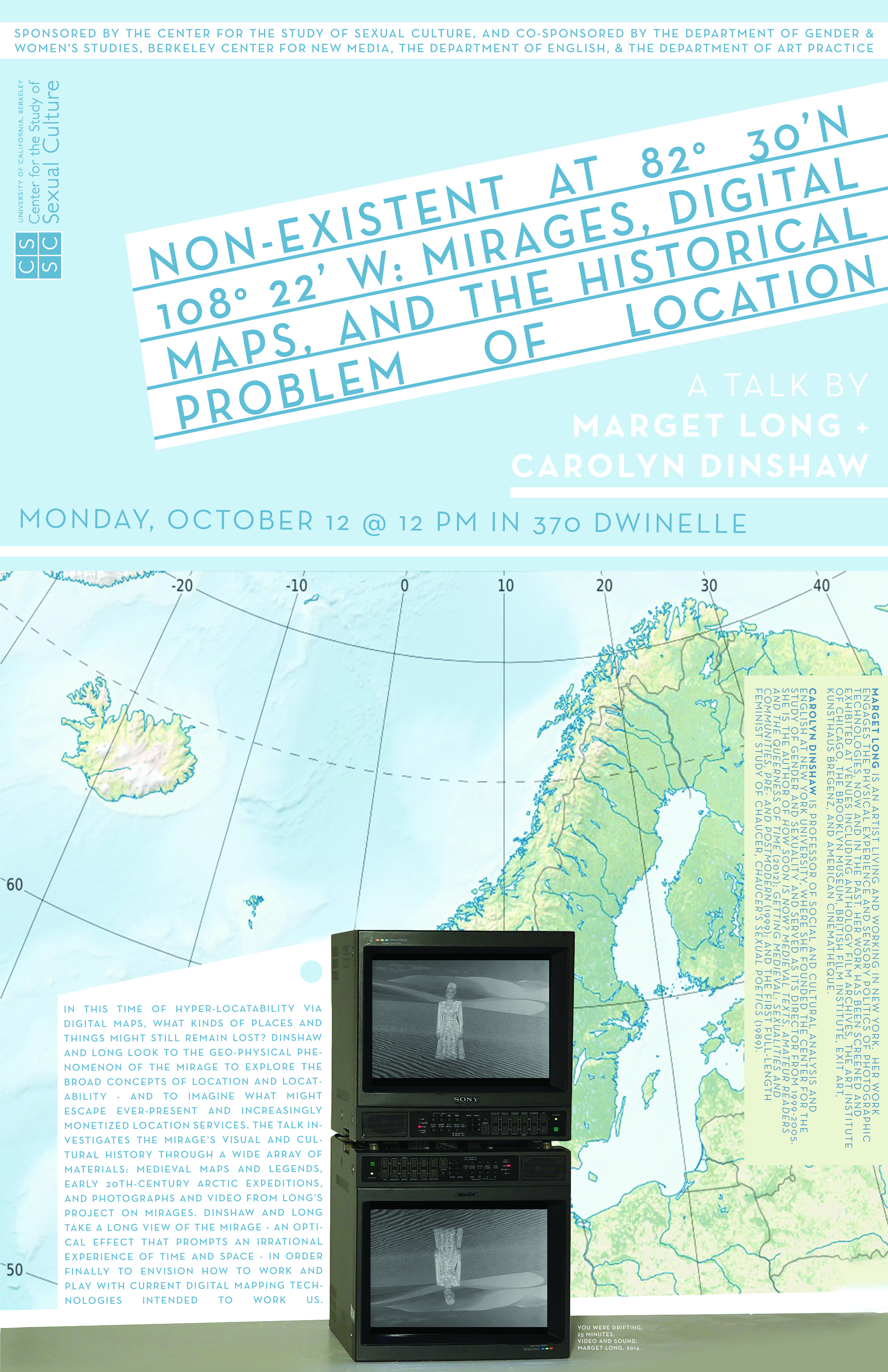
Sponsored by the Center for the Study of Sexual Culture, and co-sponsored by the Department of Art Practice, the Department of English, the Berkeley Center for New Media, and the Department of Gender & Women’s Studies.
Networked Boredom: On the Desire for Connection
This talk addresses the ordinariness of a basic fact of much contemporary life: the compulsory (if not compulsive), ubiquitous, and permanent availability of and on the network. My central case is a set of social practices practices in and around gay hookup or sex sites and apps, most especially Grindr. Taking a phenomenological approach and thinking with, by turns, film theory, media theory, affect theory, queer theory, and psychoanalytical object relations theory, I describe the common practices of “looking around” and waiting for messages from unspecified others. Grindr and its relatives are paradigmatic not only because they offer interfaces to the Internet as an infrastructural network, but also offer “connection” as an organizing metaphor for sexual (or polymorphously other) encounters between men. These networks specify genres of both the abstractness of boredom and the impersonality of desire—as enabling conditions for connection, but also as forms of mitigating the risk and exposure that are endemic to encounter and desire. Such risk management—anonymity, impersonality—is nothing new to gay or MSM sexual practices and cultures. The novelty here lies in the details: the technical interface and its design, the temporality of always-on availability, and the abstracted elsewhere-embodiment of the terminal. Grindr dramatizes that, increasingly, the impersonality of desire is yoked to the impersonality of technical protocol. Its abstracted and networked waiting-for-connection indexes a shift both in our capacity for aloneness and our capacity for being-with-others. The network engenders novel forms of boredom, in which our desire is organized not by anything in particular, but rather the network’s own metaphor for encountering, mere “connection.”
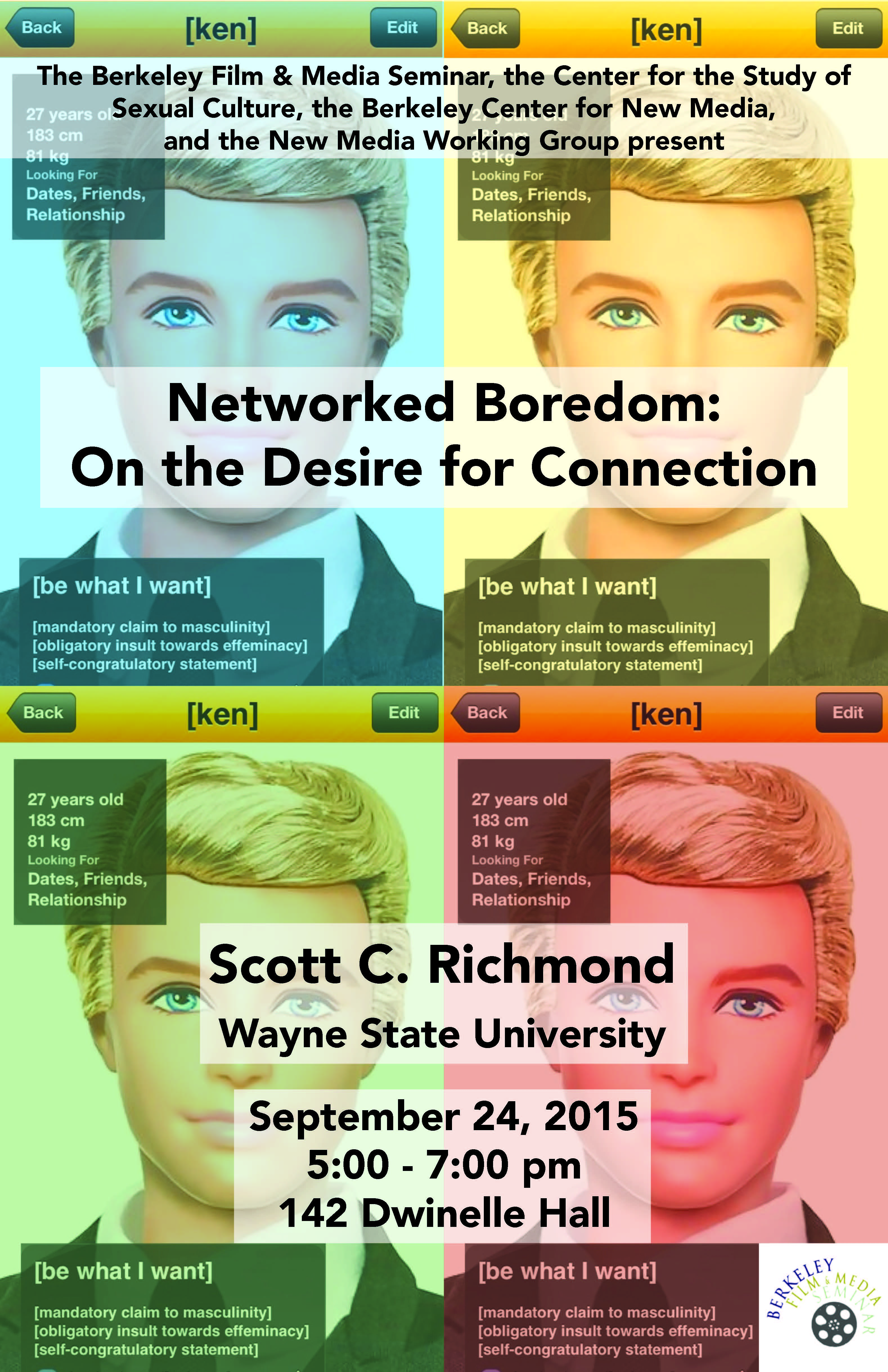
Queer of Color Working Group Meeting
Please join the Queer of Color Working Group as we begin the fall semester with light readings and refreshments. We’ll be at our usual spot in Barrows 602, so come introduce yourselves and help us plan for the year. Lastly, we’ll be discussing some work from the recent issue of Differences on the centrality of anti-normativity to queer studies, and whether or not it is running out of steam. So please, come out with us – we’re excited to be in your company again, and hope to see you soon!
For copies of the readings or to be added to the mailing list, please contact either brandon.callender@berkeley.edu or cornejo@berkeley.edu
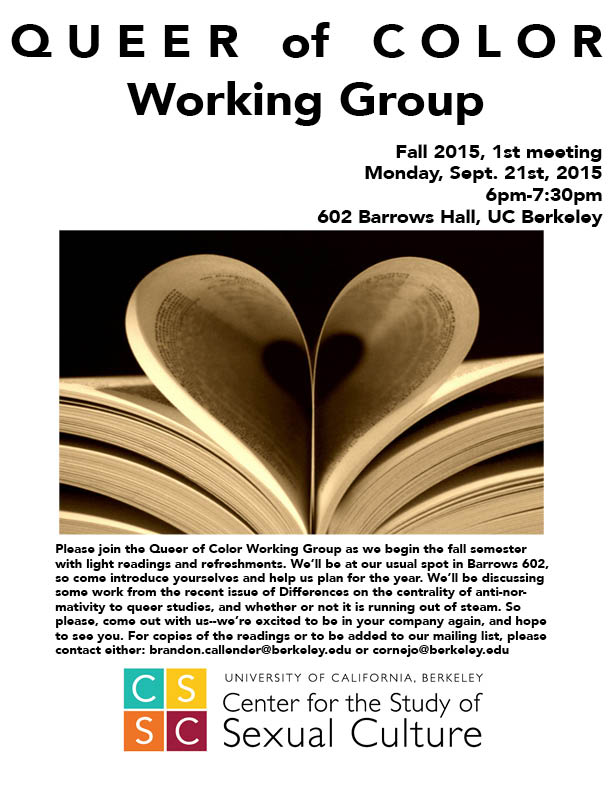
Disability & Sexuality Studies Working Group Meeting
Refreshments provided
All events are scent-free
About us
The Disability and Sexuality Studies working group provides a space for inquiry into both disability scholarship and activism. Through connecting readings with current events, screenings, performances, etc., the group explores the intersections of queer theory and disability studies. Sponsored by the Center for the Study of Sexual Culture. For more information contact co-coordinators, Gracen Brilmyer and Natalia Duong at ucbdss@gmail.com
Please email: ucbdss@gmail.com with any accessibility questions/needs/concerns
DSS events are open to all.
Sponsored by the UC Berkeley Center for the Study of Sexual Culture.
Disability and Sexuality Studies Working Group Meeting
In our May meeting we will be reading chapter 1 of Lauren Berant’s Cruel Optimism and we have an optional article from Petra Kuppers: Toward a Rhizomatic Model of Disability: Poetry, Performance, and Touch.
For PDFs of readings, please email: ucbdss@gmail.com
*all DSS meetings are scent-free
Queering Neural Citizenship: Lessons from Autism and Neurodiversity
Neural knowledge is transforming how we identify, understand, and manage personhood and citizenship vis-a-vis conceptions of “normal” and “abnormal” brains. Consequently, neural citizenship projects (like biological ones) describe how neural knowledge is increasingly used to identify, mark, and act upon individuals as part of populations. As an “abnormal” neurotype, autism dominates national imaginaries and debates while contestations over its meaning ripple and rage through social, political, and scientific networks proliferating and intensifying neurality. From vaccine resistance to neurodiversity, divergent responses to autism index the increasing presence and significance of neural citizenship. Warrior mothers and immunity moms manage neural citizenship of their children by seeking to rescue their children from the “threat” of autism or to avoid the threat altogether by resisting vaccines. Neurodiversity advocates challenge the barriers that limit the participation of autistics in society by arguing for belonging, legitimacy, and citizenship rights through self-advocacy, disability rights, and acceptance in place of rehabilitation, institutionalization, and normalization. Advocating that queer studies must engage with neurality and neural citizenship, this presentation considers what lessons can be drawn from queering autism and neurodiversity.
Jigna Desai is the chair of and Professor in the Department of Gender, Women, and Sexuality Studies and a founding member and former director of the Asian American Studies Program at the University of Minnesota. Her research interests include Asian American, postcolonial, queer, and feminist disability studies. Her book Beyond Bollywood: The Cultural Politics of South Asian Diasporic Film is the first book on the complex gender, sexual, and racial politics of South Asian diasporas (Routledge 2004). It is also critical to the formation of the global subfield of Bollywood Studies. She has co-edited several collections — Bollywood: A Reader (Open University /McGraw Hill Press, 2009), Transnational Feminism and Global Advocacy in South Asia (Routledge, 2012), and Asian Americans in Dixie: Race and Migration in the South (University of Illinois Press, 2013). She has published widely on issues of race, media, gender, and sexuality in journals such as Social Text, Journal of Asian American Studies, and Meridiens. She serves on editorial boards for several international journals and as a co-editor of the Asian American Experience book series for the Univ. of Illinois Press. She has taught over 15 different undergraduate and graduate at the Univ. of Minnesota as well held a visiting professorship at Harvard University. She has also been honored with the “Red Motley” Undergraduate Teaching Award, the Association for Asian American Studies Mentoring Award, Graduate Mentoring Award and a University of Minnesota Service Award. This work is part of a larger project on neural citizenship.
This event is free, open to the public, and wheelchair accessible. Please refrain from wearing scented products so that people with chemical sensitivities can participate. If you need any other disability accommodation in order to attend, including communication services, please contact Mel Y. Chen melychen@berkeley.edu
This event is co-sponsored by the Department of Gender & Women’s Studies and the Haas LGBTQ Citizenship Cluster.
Part of the CSSC’s 2014-15 Speaker Series.
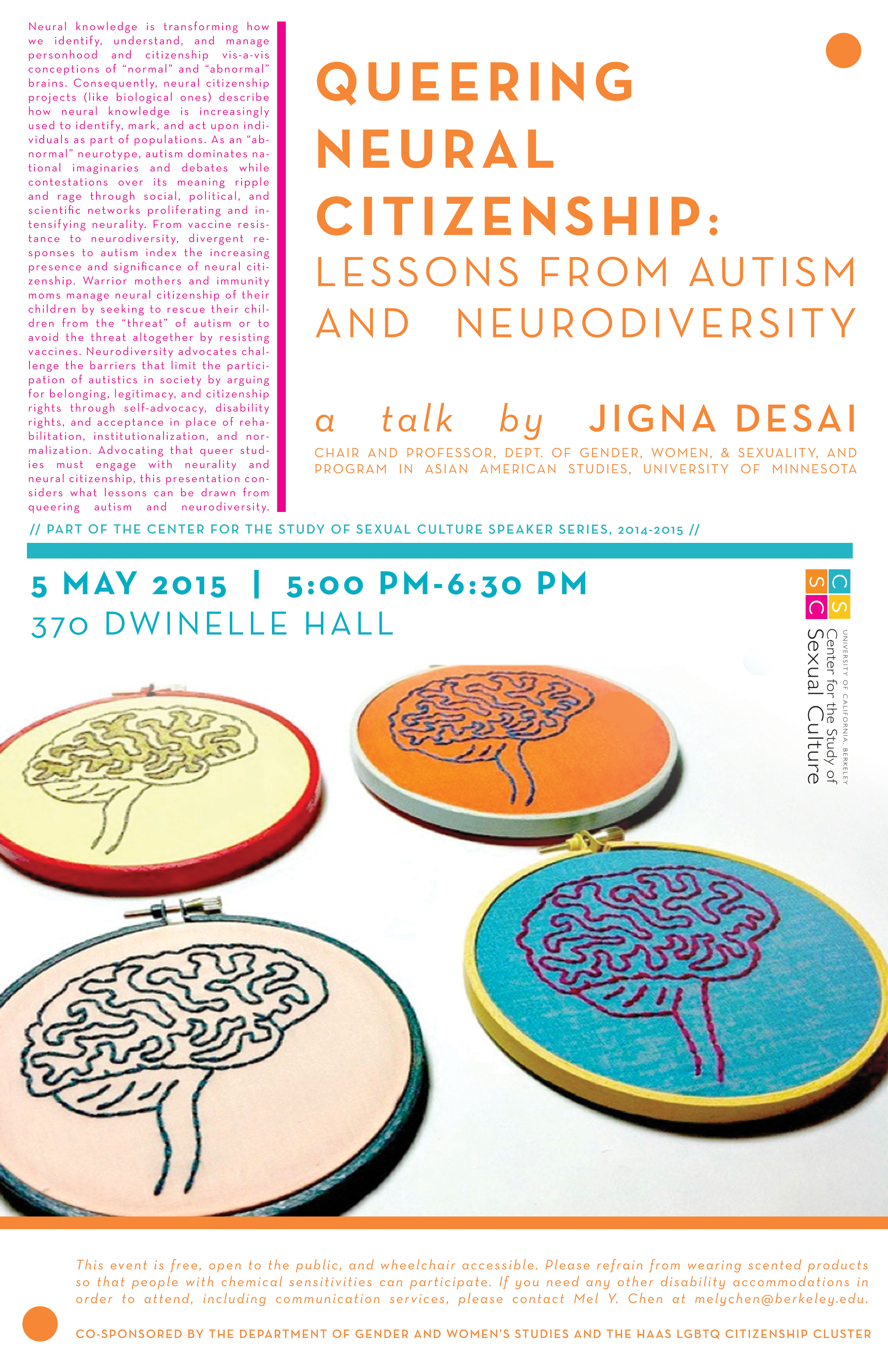
Disability and Sexuality Studies Working Group Meeting
We will be discussing the introduction and Chapters 1, 3, & 7 from Feminist, Queer, Crip by Alison Kafer (along with any other chapters you’d like to read). Axis Dance is having a performance on April 8th at SOMArts (San Francisco) that we are going to try to attend. More information and tickets can be found at: http://www.axisdance.org/season/
DSS events are open to all
All DSS meetings are scent-freeAbout us
The Disability and Sexuality Studies working group provides a space for inquiry into both disability scholarship and activism. Through connecting readings with current events, screenings, performances, etc., the group explores the intersections of queer theory and disability studies. Sponsored by the Center for the Study of Sexual Culture. For more information contact co-coordinators, Gracen Brilmyer and Natalia Duong at ucbdss@gmail.com
“Nothing is True, Everything is Permitted”: Indigenous Animus in the Age of Liberation
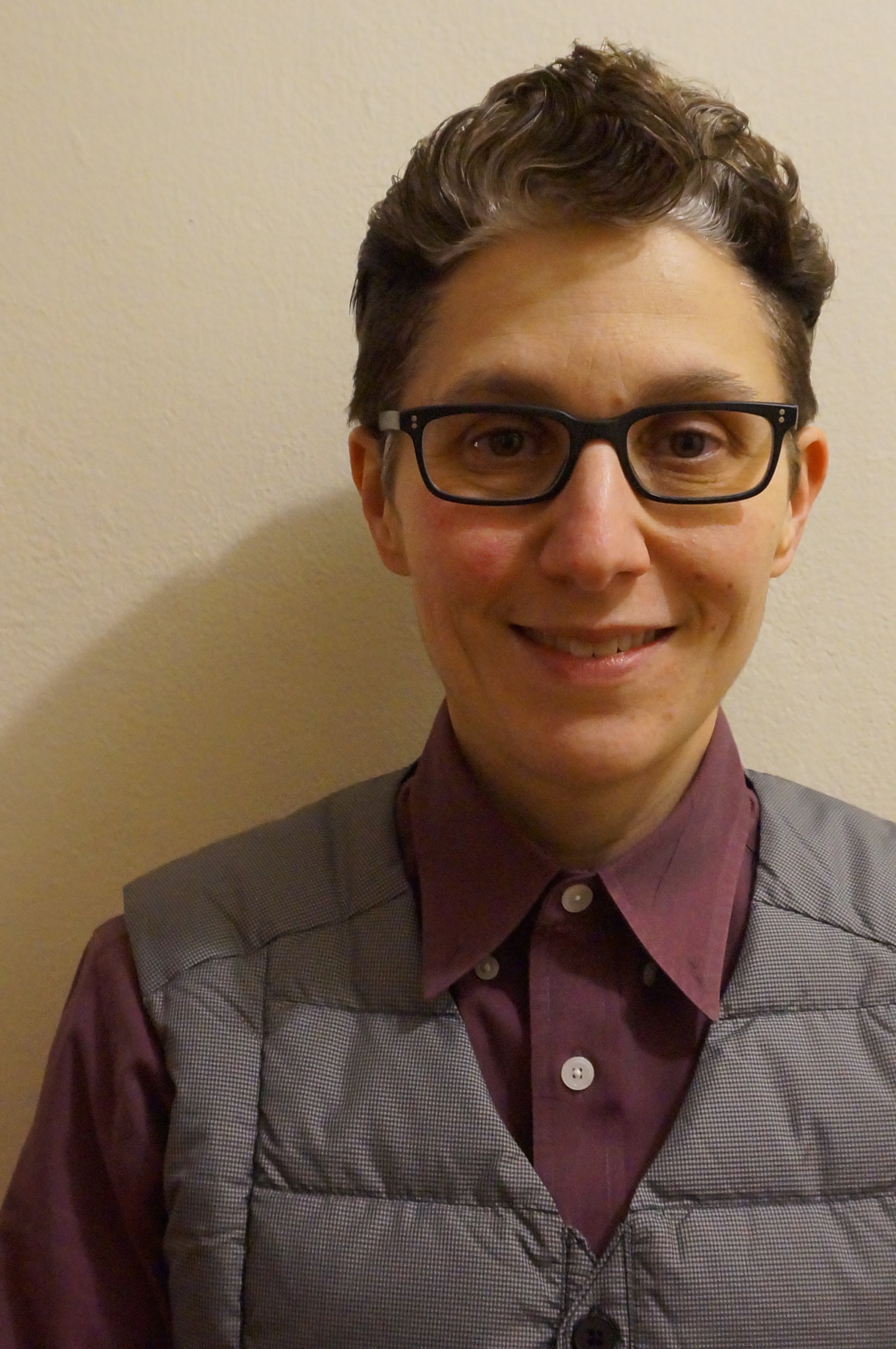 Close-reading Assassin’s Creed 3 and Assassin’s Creed: Liberation, this paper will consider how American Indian and Indigenous studies might intersect with videogame studies, especially at the sites of narrative, racial representations, and history. Examining how settler colonialism is reimagined through digital space, the paper will discuss how indigeneity might disrupt the historicities of code and play.
Close-reading Assassin’s Creed 3 and Assassin’s Creed: Liberation, this paper will consider how American Indian and Indigenous studies might intersect with videogame studies, especially at the sites of narrative, racial representations, and history. Examining how settler colonialism is reimagined through digital space, the paper will discuss how indigeneity might disrupt the historicities of code and play.
Jodi A. Byrd is a citizen of the Chickasaw Nation of Oklahoma and associate professor of American Indian Studies and English at the University of Illinois at Urbana-Champaign. Her articles have appeared in American Indian Quarterly, Cultural Studies Review, Interventions, J19, American Quarterly, and College Literature. She is the author of The Transit of Empire: Indigenous Critiques of Colonialism (University of Minnesota Press, 2011).
This event is co-sponsored by the Center for Race & Gender, the Department of Film & Media, the Department of Gender & Women’s Studies, and the Native American Studies Program.
Part of the CSSC’s 2014-15 Speaker Series.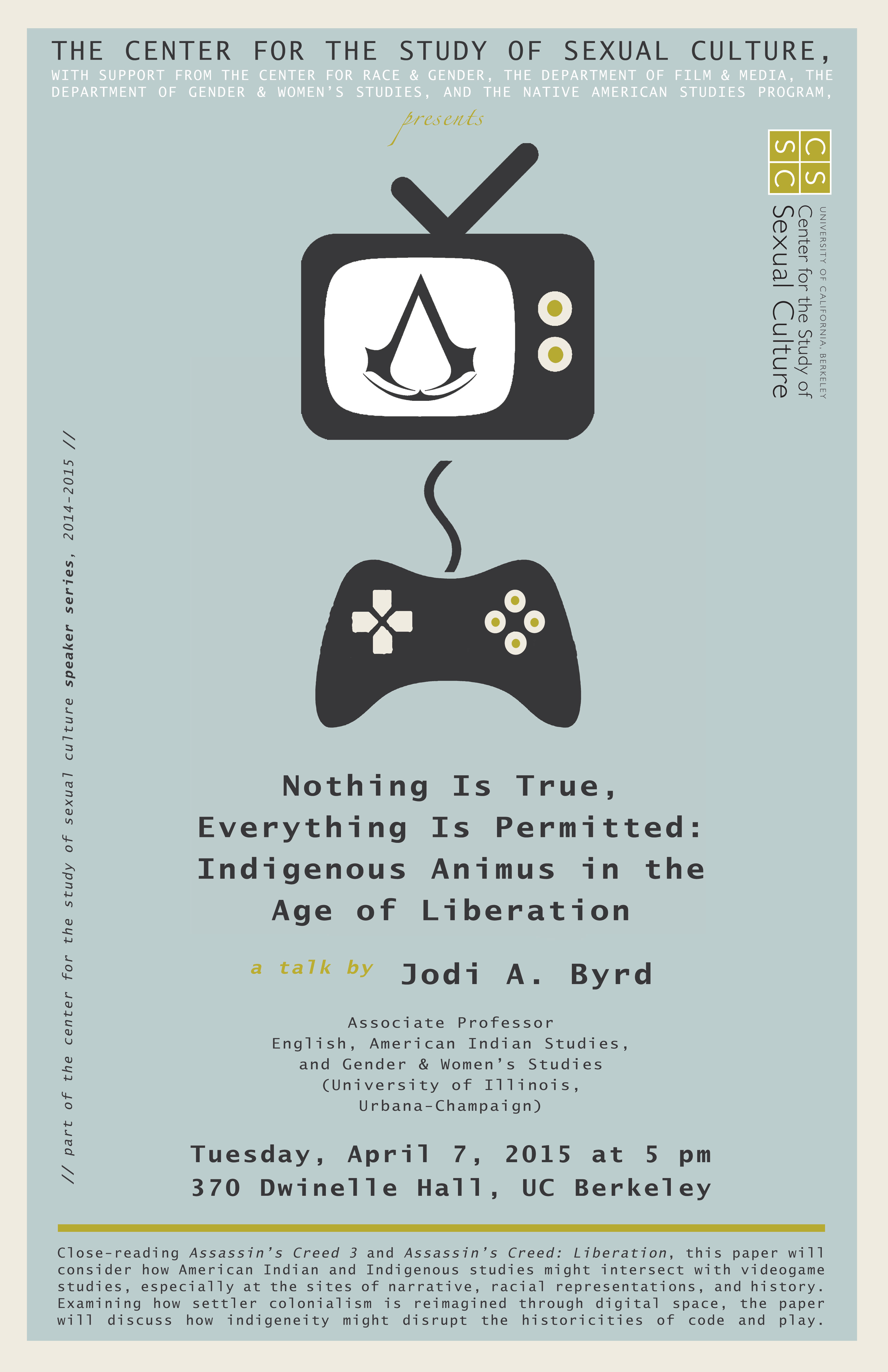
Disability & Sexuality Studies Working Group meeting
Please email ucbdss@gmail.com for readings.
For more information on the Disability Incarcerated Events please visit: http://diversity.berkeley.edu/disabilityincarcerated
DSS events are open to all.
Sponsored by the Center for the Study of Sexual Culture.
Vaginal Impressions: The Affective Biopolitics of the First Women Physicians
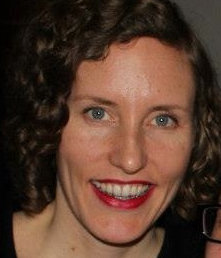 This talk proposes that the notion of the human nervous system as an impressible, malleable entity continuously remade by contact with its environment lies at the heart of nineteenth-century U.S. cultural politics. Theorizing “impressibility” as a nineteenth-century keyword linking race and sexuality, the talk explores how scientists, reformers, and writers alike saw themselves as working in concert with a neurobiological substrate that they conceived of as, in its ideal form, fluid, malleable, and forever in dynamic exchange with surrounding bodies, objects, and forces. I show how the modern formations of race and sexual difference consolidated in part as a discourse of the variegated capacity of neurological responsiveness. Before genetics, sensory contact between bodies and the differentially affective qualities of the human nervous system was understood to shape hereditary legacies. The talk’s investigation of the pre-determinist materiality of the body provides an important perspective on the biopolitics of affect and the stakes of feminist materialisms.
This talk proposes that the notion of the human nervous system as an impressible, malleable entity continuously remade by contact with its environment lies at the heart of nineteenth-century U.S. cultural politics. Theorizing “impressibility” as a nineteenth-century keyword linking race and sexuality, the talk explores how scientists, reformers, and writers alike saw themselves as working in concert with a neurobiological substrate that they conceived of as, in its ideal form, fluid, malleable, and forever in dynamic exchange with surrounding bodies, objects, and forces. I show how the modern formations of race and sexual difference consolidated in part as a discourse of the variegated capacity of neurological responsiveness. Before genetics, sensory contact between bodies and the differentially affective qualities of the human nervous system was understood to shape hereditary legacies. The talk’s investigation of the pre-determinist materiality of the body provides an important perspective on the biopolitics of affect and the stakes of feminist materialisms.
Kyla Schuller is Assistant Professor of Women’s and Gender Studies at Rutgers University, New Brunswick, where she teaches and researches the intersections between race, gender, sexuality, and the sciences. Her areas of focus include histories of eugenics and reproduction, nineteenth-century American Studies, popular culture, and critical race and queer theory. She is currently at work on her first book project, The Sentimental Politics of Life: Race, Sexuality and Biopower in the Nineteenth-Century United States. This manuscript explores the meaning and materiality of race, sexuality, and heredity in the decades prior to the debut of the “gene.” Examining such topics as the racial politics of the first generation of female physicians, the role of birth control in black uplift struggles, and non-Darwinian evolutionary theories, the book argues that nineteenth-century middle-class culture developed a deep investment in improving the biological stock of the national population. She has held a prestigious ACLS New Faculty Fellowship and positions at UC San Diego, UC Berkeley, the UC Humanities Research Institute, and Utrecht University, the Netherlands. Her peer-reviewed articles explore the cultural history of cosmetic surgery in the Americas, the role of sentimentalism in the paleontological sciences, the politics of the blockbuster film Avatar, and other subjects in feminist science studies.
Part of the CSSC 2014-15 Speaker Series. This event is free and open to the public.
This event is co-sponsored by the Center for Science, Technology, Medicine & Society, the Department of English, and the Department of Gender and Women’s Studies.
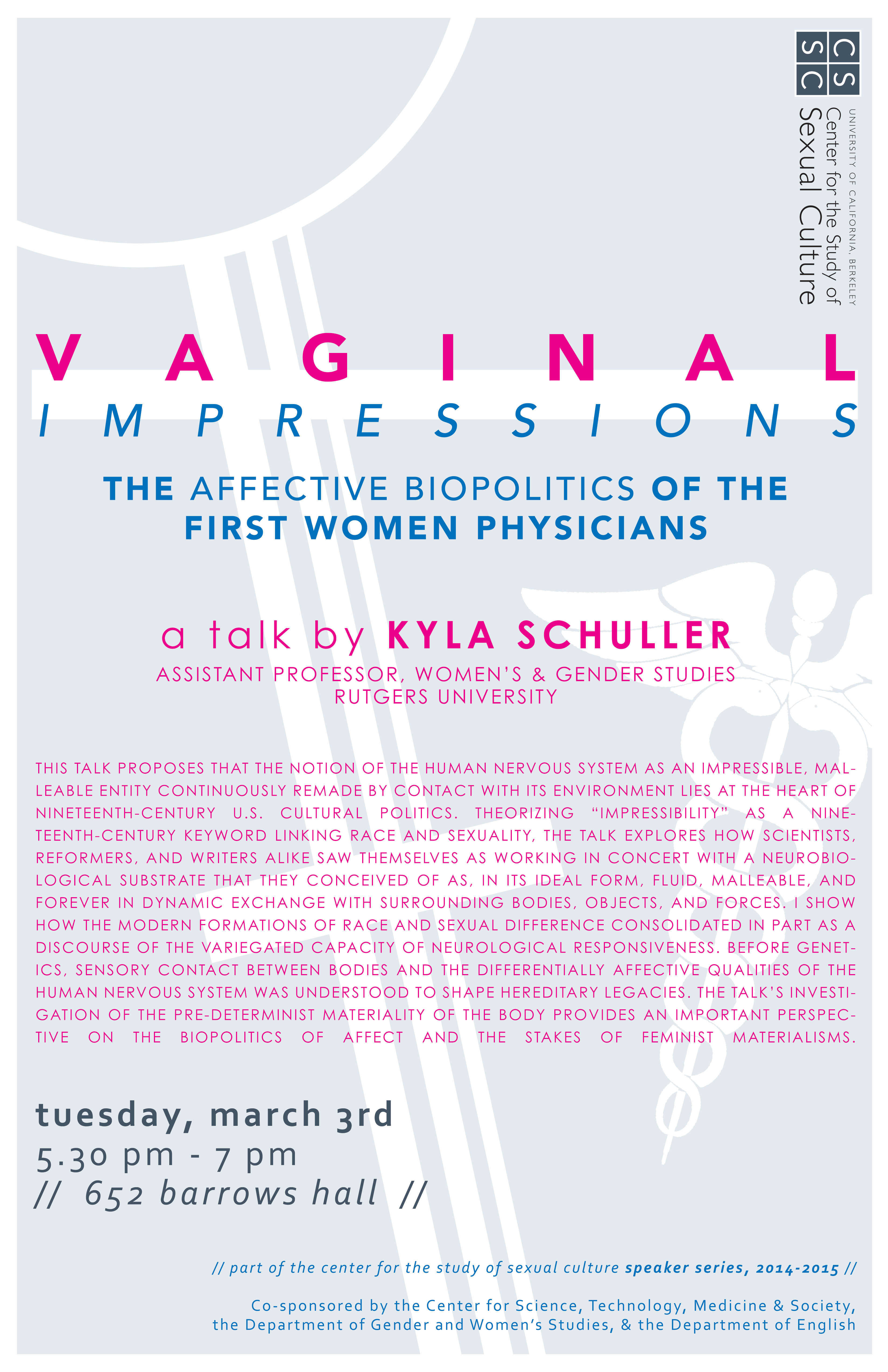
Queer of Color Working Group meeting
Please join the Queer of Color Working Group for a discussion of Nguyen Tan Hoang’s A View from the Bottom: Asian American Masculinity and Sexual Representation. We’ll be discussing the introduction and the second chapter, “Reflections on an Asian Bottom” over drinks and snacks. Come out with us – we’ll be in Barrows 602!
For a PDF of the readings, please e-mail brandon.callender@berkeley.edu
All events are free and open to the public.
Sponsored by the Center for the Study of Sexual Culture.
Queering Agriculture: Food Security in the Nation’s Capital and the Crises of Reproductive American Familism
Attention: New Location–340 Moffitt, off of the Commons
So why queer agriculture? This seems like an odd question but becomes more obvious with research and analysis. This talk highlights vital ways queering and trans-ing ideas and practices of agriculture are necessary for more sustainable, sovereign, and equitable food systems for the creatures and systems involved in systemic reproductions that feed humans and other creatures. Since agriculture is literally the backbone of economics, politics, and “civilized” life as we know it, and the manipulation of reproduction and sexuality are a foundation of agriculture, it is absolutely crucial queer and transgender studies begin to deal more seriously with the subject of agriculture. This talk highlights the normative ways that popular culture, food activism, and government regulations have framed sustainable food systems in the United States. By focusing on popular culture representations and government legislation since 9/11, it will become clearer how the growing popularity of sustainable food is laden with anthroheterocentric assumptions of the “good life” coupled with idealized images and ideas of the American farm, and gender, radicalized and normative standards of health, family, and nation.
Bailey Kier is Ph.D candidate in American Studies and an Administrative Coordinator at the University of Maryland, College Park. Originally from a white working class community in the Cascade Mountains of Western Washington, Kier’s work is heavily influenced from the simultaneous beauty, devastation, poverty, and libertarianism of the logging and mining cultures of the Pacific Northwest. Kier’s dissertation “An American River: A Queer Geography of the Potomac River Basin and Environmentalism in the Nation’s Capitol” examines how mainstream environmentalism has not merely been the benevolent project it’s often represented as, but instead can more accurately be described as the management of populations, resources, and species. Kier’s work has been published in Women and Performance, The Transgender Studies Reader 2, and The New Inquiry. Kier’s research interests include queer ecologies, hydrology, natural history, transgender studies, and studies of science.
Part of the CSSC 2014-15 Speaker Series. This event is free and open to the public.
Disability and Sexuality Studies Working Group
Please join The Disability and Sexuality Studies working group for our first meeting to introduce the group and discuss topics for future meetings*
Refreshments provided
*all events are scent-free
About us
The Disability and Sexuality Studies working group provides a space for inquiry into both disability scholarship and activism. Through connecting readings with current events, screenings, performances, etc., the group explores the intersections of queer theory and disability studies.
Sponsored by the Center for the Study of Sexual Culture.
For more information contact co-coordinators, Gracen Brilmyer and Natalia Duong at ucbdss@gmail.com
Please email: ucbdss@gmail.com with any accessibility questions/needs/concerns
In Treatment: Psychiatry and the Archives of Modern Sexuality
This talk explores the encounter of sexual- and gender-variant people with psychiatry and psychoanalysis in mid-twentieth-century America and examines the role of psychiatric scrutiny and stigma in the making of modern sexuality. Focusing on the archive of St. Elizabeths Hospital, the federal hospital for the mentally ill in Washington, DC, Kunzel reflects on its meaning and challenges to queer history.
RSVP: https://berkeleylaw.wufoo.com/forms/regina-kunzel-talk/
Contact us at spes@law.berkeley.edu if you have any question
This event is sponsored by the LGBTQ Cluster of HIFIS and Center for the Study of Sexual Culture

